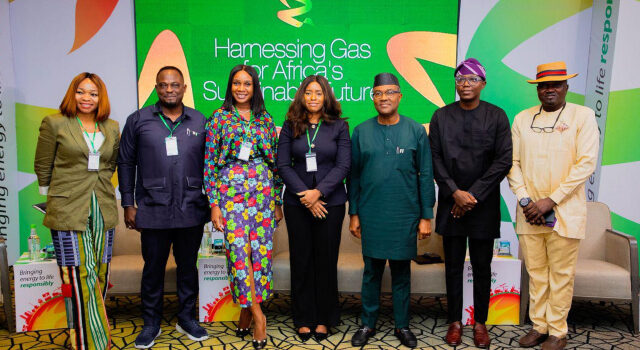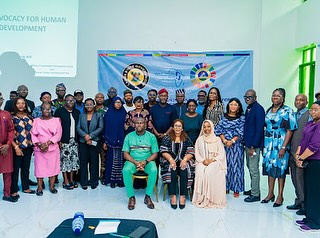Jonathan Njoku, Senior Supervisor, Planning, Research and Statistics, NCDMB, and Charlotte Essiet, Lead Facilitator of Elint Systems with delegates of P100 companies at the NCDMB training on partnerships and Alliances in Lagos.
The Nigerian Content Development Monitoring Board (NCDMB) has continued to receive commendations on the impact and sustainability of it’s Project100 Initiative.
Launched in 2019 with an initial cohort of 60 companies and expanded in 2021 to include 40 more, the ‘Project100’ initiative identifies, mentors, and scales high-performing indigenous companies, transforming them into key contributors to national economic growth
Since it’s launch, the initiative has transited to become a cornerstone of NCDMB’s mission to deepen local content, empower entrepreneurs, and catalyze innovation in Nigeria’s energy sector.
Continuing the tradition of fostering local content, the NCDMB recently held a three-day training session wherein Project 100 beneficiaries were equipped with tools to forge strategic alliances and partnerships.
The training program emphasized collaboration as a means to boost value addition, scale operations sustainably, and secure competitive advantages in the oil and gas industry.
The Project 100 beneficiaries were equipped with advanced skills to scale up as leading Nigerian oil and gas servicing companies, enabling them to deliver world-class projects and foster regional collaboration with counterparts in Ghana and across West Africa.
The beneficiaries have, therefore, called on the Nigerian Content Development and Monitoring Board (NCDMB) and the Ministry of Petroleum Resources to transition and institutionalize the Project 100 initiative as a sectoral working group to enhance its impact and ensure its long-term sustainability within the oil and gas industry.
The beneficiaries announced this after a series of impactful capacity-building initiatives organized by the NCDMB and its partners to empower indigenous oil and gas service companies for greater contributions and influence within the industry.
According to participants, the recently concluded training sessions were pivotal in fostering growth, driving innovation, and equipping local businesses to compete effectively on a global scale.
The session showcased success stories of cross-border collaborations, particularly with counterparts in Ghana, highlighting the potential for regional synergies across West Africa.
A second phase of the training focused on business innovation, providing participants with proven strategies to transform operations and sustain their contributions to Nigeria’s oil and gas value chain.
The beneficiaries commended the NCDMB for its commitment and called for Project 100 to be transitioned into a sectoral working group to further institutionalize its impact and sustain its objectives.
Mr. Bode Ogundipe, CEO of SPROVAB Nigeria Ltd and a prominent voice within Project 100, has commended the Nigerian Content Development and Monitoring Board (NCDMB) for its unwavering support of indigenous companies.
Speaking on the sidelines of the transformative partnership and alliance workshops, Ogundipe lauded the dedication of Engr. Felix Ogbe, Executive Secretary of NCDMB, and his team in advancing local content initiatives.
Ogundipe advocated for Project 100 to evolve into a sectoral working group, emphasizing its potential to shape industry policies and practices focused on targeted and transnational enablement for Nigerian businesses.
“This initiative is not just about supporting companies but creating a platform for policy innovation and strategic alignment that advances Nigeria’s local content agenda,” he stated.
Similarly, Engr. Uchenna Duaka, Managing Director of Hull Inspection Services Ltd, praised the NCDMB for the Project 100 initiative, emphasizing its potential to deliver transformative changes if fully implemented.
Since its launch, Project 100 has established itself as a catalyst for Nigeria’s industrial growth by empowering indigenous businesses to compete globally. The initiative positions the NCDMB as a leader in promoting local content and sustainable economic development within Nigeria and the broader African oil and gas sector.








Everything is very open and very clear explanation of issues. was truly information. Your website is very useful. Thanks for sharing.